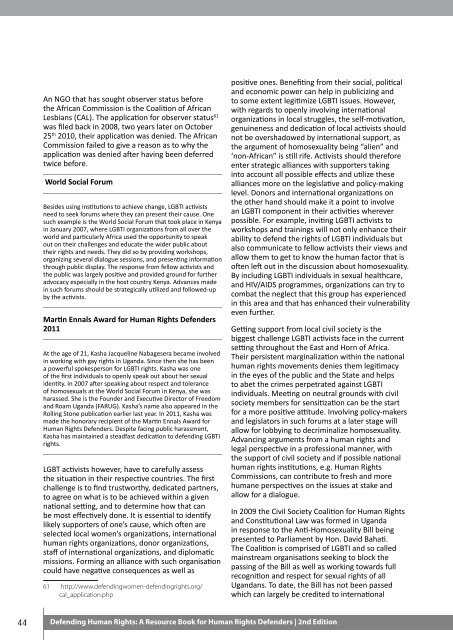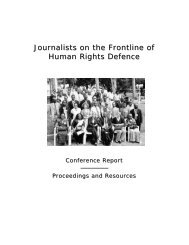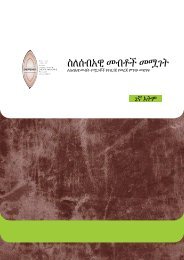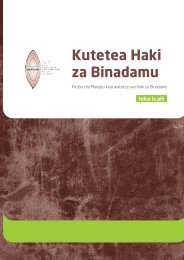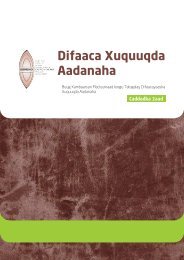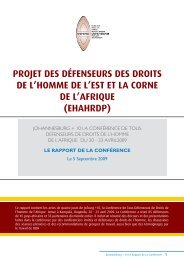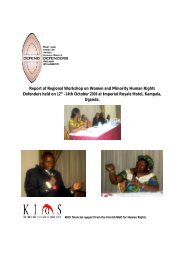Defending Human Rights: A Resource Book for Human
Defending Human Rights: A Resource Book for Human
Defending Human Rights: A Resource Book for Human
You also want an ePaper? Increase the reach of your titles
YUMPU automatically turns print PDFs into web optimized ePapers that Google loves.
An NGO that has sought observer status be<strong>for</strong>e<br />
the African Commission is the Coalition of African<br />
Lesbians (CAL). The application <strong>for</strong> observer status 61<br />
was filed back in 2008, two years later on October<br />
25 th 2010, their application was denied. The African<br />
Commission failed to give a reason as to why the<br />
application was denied after having been deferred<br />
twice be<strong>for</strong>e.<br />
World Social Forum<br />
Besides using institutions to achieve change, LGBTI activists<br />
need to seek <strong>for</strong>ums where they can present their cause. One<br />
such example is the World Social Forum that took place in Kenya<br />
in January 2007, where LGBTI organizations from all over the<br />
world and particularly Africa used the opportunity to speak<br />
out on their challenges and educate the wider public about<br />
their rights and needs. They did so by providing workshops,<br />
organizing several dialogue sessions, and presenting in<strong>for</strong>mation<br />
through public display. The response from fellow activists and<br />
the public was largely positive and provided ground <strong>for</strong> further<br />
advocacy especially in the host country Kenya. Advances made<br />
in such <strong>for</strong>ums should be strategically utilized and followed-up<br />
by the activists.<br />
Martin Ennals Award <strong>for</strong> <strong>Human</strong> <strong>Rights</strong> Defenders<br />
2011<br />
At the age of 21, Kasha Jacqueline Nabagesera became involved<br />
in working with gay rights in Uganda. Since then she has been<br />
a powerful spokesperson <strong>for</strong> LGBTI rights. Kasha was one<br />
of the first individuals to openly speak out about her sexual<br />
identity. In 2007 after speaking about respect and tolerance<br />
of homosexuals at the World Social Forum in Kenya, she was<br />
harassed. She is the Founder and Executive Director of Freedom<br />
and Roam Uganda (FARUG). Kasha’s name also appeared in the<br />
Rolling Stone publication earlier last year. In 2011, Kasha was<br />
made the honorary recipient of the Martin Ennals Award <strong>for</strong><br />
<strong>Human</strong> <strong>Rights</strong> Defenders. Despite facing public harassment,<br />
Kasha has maintained a steadfast dedication to defending LGBTI<br />
rights.<br />
LGBT activists however, have to carefully assess<br />
the situation in their respective countries. The first<br />
challenge is to find trustworthy, dedicated partners,<br />
to agree on what is to be achieved within a given<br />
national setting, and to determine how that can<br />
be most effectively done. It is essential to identify<br />
likely supporters of one’s cause, which often are<br />
selected local women’s organizations, international<br />
human rights organizations, donor organizations,<br />
staff of international organizations, and diplomatic<br />
missions. Forming an alliance with such organisation<br />
could have negative consequences as well as<br />
61 http://www.defendingwomen-defendingrights.org/<br />
cal_application.php<br />
positive ones. Benefiting from their social, political<br />
and economic power can help in publicizing and<br />
to some extent legitimize LGBTI issues. However,<br />
with regards to openly involving international<br />
organizations in local struggles, the self-motivation,<br />
genuineness and dedication of local activists should<br />
not be overshadowed by international support, as<br />
the argument of homosexuality being “alien” and<br />
‘non-African” is still rife. Activists should there<strong>for</strong>e<br />
enter strategic alliances with supporters taking<br />
into account all possible effects and utilize these<br />
alliances more on the legislative and policy-making<br />
level. Donors and international organizations on<br />
the other hand should make it a point to involve<br />
an LGBTI component in their activities wherever<br />
possible. For example, inviting LGBTI activists to<br />
workshops and trainings will not only enhance their<br />
ability to defend the rights of LGBTI individuals but<br />
also communicate to fellow activists their views and<br />
allow them to get to know the human factor that is<br />
often left out in the discussion about homosexuality.<br />
By including LGBTI individuals in sexual healthcare,<br />
and HIV/AIDS programmes, organizations can try to<br />
combat the neglect that this group has experienced<br />
in this area and that has enhanced their vulnerability<br />
even further.<br />
Getting support from local civil society is the<br />
biggest challenge LGBTI activists face in the current<br />
setting throughout the East and Horn of Africa.<br />
Their persistent marginalization within the national<br />
human rights movements denies them legitimacy<br />
in the eyes of the public and the State and helps<br />
to abet the crimes perpetrated against LGBTI<br />
individuals. Meeting on neutral grounds with civil<br />
society members <strong>for</strong> sensitization can be the start<br />
<strong>for</strong> a more positive attitude. Involving policy-makers<br />
and legislators in such <strong>for</strong>ums at a later stage will<br />
allow <strong>for</strong> lobbying to decriminalize homosexuality.<br />
Advancing arguments from a human rights and<br />
legal perspective in a professional manner, with<br />
the support of civil society and if possible national<br />
human rights institutions, e.g. <strong>Human</strong> <strong>Rights</strong><br />
Commissions, can contribute to fresh and more<br />
humane perspectives on the issues at stake and<br />
allow <strong>for</strong> a dialogue.<br />
In 2009 the Civil Society Coalition <strong>for</strong> <strong>Human</strong> <strong>Rights</strong><br />
and Constitutional Law was <strong>for</strong>med in Uganda<br />
in response to the Anti-Homosexuality Bill being<br />
presented to Parliament by Hon. David Bahati.<br />
The Coalition is comprised of LGBTI and so called<br />
mainstream organisations seeking to block the<br />
passing of the Bill as well as working towards full<br />
recognition and respect <strong>for</strong> sexual rights of all<br />
Ugandans. To date, the Bill has not been passed<br />
which can largely be credited to international<br />
44<br />
<strong>Defending</strong> <strong>Human</strong> <strong>Rights</strong>: A <strong>Resource</strong> <strong>Book</strong> <strong>for</strong> <strong>Human</strong> <strong>Rights</strong> Defenders | 2nd Edition


